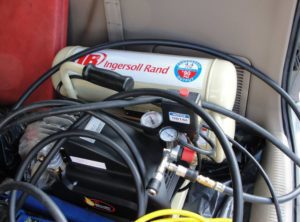 Air compressors have a lot of applications at home and workplaces. For this reason, there is a need for an understanding of how they work and how the users can prevent problems in their use. The life of an air compressor can be enhanced if the user keeps track of it and takes care of the problems that might disrupt its normal functioning.
Air compressors have a lot of applications at home and workplaces. For this reason, there is a need for an understanding of how they work and how the users can prevent problems in their use. The life of an air compressor can be enhanced if the user keeps track of it and takes care of the problems that might disrupt its normal functioning.
Many problems can create a serious issue regarding the normal functioning of an air compressor. One of these issues is the accumulation of water in the compressor tank and other compressor parts. If it continues to accumulate and crosses a certain level, it can cause harm to the machine.
Here is a brief overview of how to keep water out of air compressor lines and keep the compressor working normally.
Contents
A Brief Introduction to Humidity in an Air Compressor
The temperature and humidity of a specific area determine the amount of humidity in an air compressor. A compressor draws air from the surrounding for compression purposes and use. Thus, humidity is a necessary part of air and will later accumulate in lines and tanks when the air is compressed.
You need to have a proper idea of how much water is accumulated in the system and avoid it. If you ignore the presence of water in the machine, it will ruin the system. Therefore, it is better to check on it and see if the machine needs the removal of water. If the compressor has water, it won’t work properly.
The problem persists, especially in summers, as the compressor compresses air more than 12 times. Here are some reasons for the presence of water in the air compressor and the methods to remove water from the compressor.
Reasons for Water in Air Compressor
There are different reasons for the presence of water in an air compressor. As said earlier, the main reason for water in the air compressor is the presence of moisture in the air. The amount of moisture in the air can increase depending on the pressure, rain, temperature, or other reasons.
So, when the air is sucked into the compressor for compression purposes, it also includes humidity. This humidity is at very low levels when the air is at normal pressure. When the compressor takes it, the pressure begins to increase, leading to humidity condensation. Thus, it accumulates in the form of drops instead of isolated particles.
These accumulated particles assume the liquid form and then cause wear and tear in the internal parts of the air compressor. Thus, humidity is the main cause that can wreak havoc on the air compressor, causing serious harm to its internal parts if left unattended.
It is better to keep water out of the machine for its smooth functioning. Here is a brief review of keeping water out of an air compressor.
Keeping Water Out of Air Compressor
The health of an air compressor remains well if its water is drained out of its lines. The procedure for it is simple and can be performed by the user who understands the basics of the machine. There are different ways to keep water out of air compressor lines.
The simplest of these is draining the tank and other parts of the air compressor. For that, the user will have to turn off the compressor to decrease the pressure outside the tank. Once this is done, they can drain the water out of the tank using the built-in valves.
A drain extension kit can also be a good help in this regard that can suck water out of the air compressor lines, and thus the internal parts of the compressor will remain safe. A water trap tool can also work for the user if they have one. It is one of the most efficient tools that can be used for draining the compressor.
An air dryer can also remove the humidity or water out of the compressor. Thus, the user of any of the mentioned methods will help keep water out of the air compressor lines.
Final Thoughts
The draining of water from the air compressor lines is easy. Different methods can be used for this purpose. Some of them are given above, and the readers can use them to keep their air compressors safe from wear and tear caused due to the presence of water in the tank or lines.
- How To Make A Confetti Cannon With An Air Compressor - December 4, 2022
- How To Keep Air Compressor From Freezing - December 3, 2022
- How To Install Oil Water Separator On Air Compressor - December 2, 2022